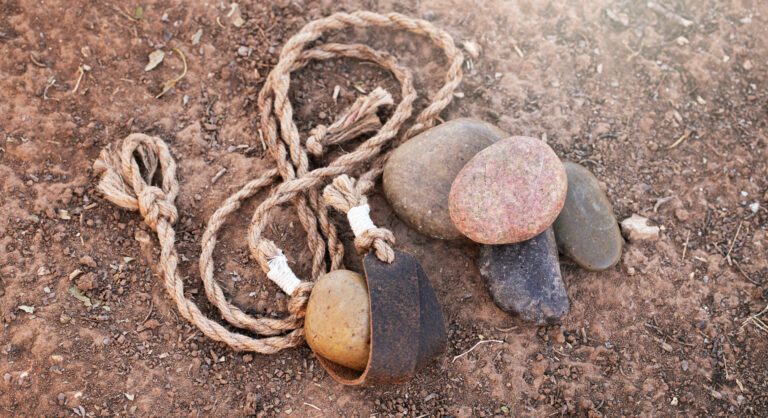Now that you have wealth, you’ve crossed over into the financial promised land. Or have you?
From the days of Adam, God cursed man with the burden of painful toil in order to produce food (Genesis 3:17). Throughout most of human history, it was necessary to store up provisions in order to survive. Wealth building is a natural human instinct that gives us security, comfort, pleasure and a profound sense of accomplishment. It’s literally in our DNA.
Even children exhibit instinctive hoarding at a very early age. If you don’t know what I’m talking about, just watch toddlers playing together with toys. God gave us this basic survival instinct, but as adults we take it to illogical extremes.
“I have seen a grievous evil under the sun: wealth hoarded to the harm of its owners.” (Ecclesiastes 5:13, NIV)
Because of the advance of technology, we live in an age where many of us have far more than we need. This plenty, ironically, can put us in a dangerous position emotionally and spiritually. Even a scientific study has proven that wealth beyond a certain point does not make us happy.[1]
“I have a lot of friends who have a lot more possessions. But in some cases, I feel the possessions possess them, rather than the other way around.” —Warren Buffett
“I have seen a grievous evil under the sun: wealth hoarded to the harm of its owners.”
As always, the Bible is way ahead of man’s wisdom. Jesus warns us of the futility and dangers of wealth: “Watch out! Be on your guard against all kinds of greed; life does not consist in an abundance of possessions” (Luke 12:15, NIV). The apostle Paul famously advised his protégé Timothy that “the love of money is a root of all kinds of evil. Some people, eager for money, have wandered from the faith and pierced themselves with many griefs” (1 Timothy 6:10, NIV).
Why can’t we reach a certain point in building wealth and then be satisfied? It would seem logical that when our basic needs are met, we could then focus on higher pursuits than accumulating wealth. Psychologists would explain this illogical human behavior by saying that our expectations and desires rise to meet any standard of living we achieve. This human phenomenon is often referred to as the “hedonic treadmill.”
Christian or not, all of us in the modern world are on the hedonic treadmill to some degree. Our time, energy, and joy are spent in a never-ending mad dash. Often, achieving material success makes us more depressed, because when happiness doesn’t come with it, we lose all hope of ever feeling fulfilled. Of course, we are looking for happiness in the wrong place.
Lottery winners are perhaps the most extreme experiment in showing that wealth does not produce happiness. I recently read about a British teen who won the Euromillions lottery when she was 17.[2] She spends some of her time on talk shows complaining about her unhappiness. People are disgusted by her complaining, but the public simultaneously finds her unhappiness fascinating.
“We are looking for happiness in the wrong place.”
Ever since I started writing my book Faith and Finances: A 21st Century Biblical Guide for Growing, Protecting and Using Your Money, I looked for interesting examples of unhappy lottery winners in the news. I wanted to make a strong point, but then, I started seeing the stories everywhere. It seemed passé to recount one of these all-too-common stories. These stories really aren’t newsworthy, because the results are predictable.
We know that almost every lottery winner ends up unhappy and broke, but then why do we keep buying tickets? Why does the Mega Millions sign with the jackpot number entice us? It’s because we think it will be different for us. God knows, I’d like to try out winning 789 million dollars. It could be different for me, right?
“But godliness with contentment is great gain. For we brought nothing into the world, and we can take nothing out of it. But if we have food and clothing, we will be content with that.” (1 Timothy 6:6-8, NIV)
We don’t need to win the lottery to be happy. We don’t need to reach that next financial milestone to be content. God offers us godliness and contentment free of charge. We just need to let go of the idea that wealth makes us happy.
Wealth Makes Us Believe We Don’t Need God
“To the angel of the church in Laodicea write . . . You say, ‘I am rich; I have everything I want. I don’t need a thing!’ And you don’t realize that you are wretched and miserable and poor and blind and naked.” (Revelation 3:14a, 17, NIV)
Laodicea was a wealthy city, renowned for its banking services and products, including eye salve medication. Jesus used specific facts about the city to deliver a compelling warning against that church’s worldly character.
What warning would Jesus deliver to the Christians in your city? What clever play on words would he use?
“You say, ‘I am rich; I have everything I want. I don’t need a thing!’ And you don’t realize that you are wretched and miserable and poor and blind and naked.”
I don’t think it’s any coincidence that the Laodicean church felt it didn’t “need a thing.” Author Neil Hood says,
“The central issue here is this: if you have faith in yourself, who needs faith in the Lord? This is a particular challenge in an age that values individualism, independence, and self-development. . . . It is probably fair to say that, in our diverse and shrinking world, consumerism is the religion of the twenty-first century. It’s the part of the globalization process that reaches into most corners of the world.”[3]
Take a step back and think about what modern money really is. Does it have intrinsic value? No, it’s just pieces of paper-like cloth or digits in a computer! However, mankind accepts it as credit for future goods and services. You store money, because you expect to be able to later redeem it for goods and services. When you are in debt, you expect to later pay it with goods and services.
Money is essentially a claim to future help from other people. After a lifetime of use, it can become very easy to put our trust in money (or man). Of course, one of the recurring themes in the Bible is trusting in God and not man. Trusting in man leads to ruin. It is indeed ironic that the United States’ official motto, “In God We Trust,” is emblazoned on its currency.
“One of the recurring themes in the Bible is trusting in God and not man.”
How about us? What do we need from God? I also don’t think it’s a coincidence that many first-world churches in today’s day and age are spiritually lethargic. I am as guilty as anyone of being comfortably numb in my first-world trappings. We need to push ourselves and heed the warning given to the Israelites who were entering the Promised Land.
“When you have eaten and are satisfied, praise the LORD your God for the good land he has given you. Be careful that you do not forget the LORD your God, failing to observe his commands, his laws and his decrees that I am giving you this day. Otherwise, when you eat and are satisfied, when you build fine houses and settle down, and when your herds and flocks grow large and your silver and gold increase and all you have is multiplied, then your heart will become proud and you will forget the LORD your God, who brought you out of Egypt, out of the land of slavery. He led you through the vast and dreadful wilderness, that thirsty and waterless land, with its venomous snakes and scorpions. He brought you water out of hard rock. He gave you manna to eat in the wilderness, something your ancestors had never known, to humble and test you so that in the end it might go well with you. You may say to yourself, ‘My power and the strength of my hands have produced this wealth for me.’ But remember the LORD your God, for it is he who gives you the ability to produce wealth, and so confirms his covenant, which he swore to your ancestors, as it is today.
“Remember the LORD your God, for it is he who gives you the ability to produce wealth…”
“If you ever forget the LORD your God and follow other gods and worship and bow down to them, I testify against you today that you will surely be destroyed. Like the nations the Lord destroyed before you, so you will be destroyed for not obeying the LORD your God.” (Deuteronomy 8:10-20, NIV; see also Hosea 13:6)
Although wealth is morally neutral, it can be spiritual nitroglycerin. We might try to use the explosive to destroy our enemies, but it is just as likely to blow us up! Our sinful human nature leads us to take credit for our wealth, become arrogant, and blow up our relationship with God. We may have prayed to land that job or to start that business, but we might just forget about all that when the money starts coming in.
The truth is that we all need God, all of the time. We need him for our joy, fulfillment, purpose, prosperity, and future well-being. The idea that we are self-sufficient is, at best, a fleeting illusion that will leave us empty. At worst, it is a vicious lie that will rob us of our salvation.
“For of this you can be sure: No immoral, impure or greedy person—such a person is an idolater—has any inheritance in the kingdom of Christ and of God.” (Ephesians 5:5, NIV)
This is one of the passages that really scares me, because I can be all three: immoral, impure and greedy. I’m more comfortable with the passages that condemn outward sins like adultery, because I can know whether or not I’m messing up. In this passage, the standard is much more subjective.
“For of this you can be sure: No immoral, impure or greedy person—such a person is an idolater—has any inheritance in the kingdom of Christ and of God.”
Rather than fearfully ignoring a Scripture like this, I think we need to humbly listen and see how it can change our lives. I suppose the question you have to ask yourself is: In my heart and in the way I live my life, am I an immoral, impure and greedy person? Since we all are, to some degree, perhaps the better question is: Am I willing to actively work on being more moral, pure, and generous? It’s critical to guard our hearts and always be striving for spiritual growth.
In the end, even the wise King Solomon let his heart drift away from God.
“As Solomon grew old, his wives turned his heart after other gods, and his heart was not fully devoted to the LORD his God, as the heart of David his father had been. He followed Ashtoreth the goddess of the Sidonians, and Molek the detestable god of the Ammonites. So Solomon did evil in the eyes of the LORD; he did not follow the Lord completely, as David his father had done.” (1 Kings 11:4-6, NIV)
Why would a king who was so rewarded by God turn from him? Why worship other gods, when it was Yahweh who gave him wisdom, wealth, and the kingship? Yes, he married many women who worshipped other gods, but I believe the underlying arrogance and ingratitude came from his wealth. Solomon did great things with his wealth, but in the end his wealth led him away from God.
“Solomon did great things with his wealth, but in the end his wealth led him away from God.”
Solomon went against many of God’s regulations for kingship, which included not acquiring Egyptian horses, not taking many wives, and not accumulating large amounts of money (Deuteronomy 17:14-20). Instead of gratitude and a focus on God, Solomon chose excess. Rather than condemning Solomon as an unusually ungrateful heretic, I think his end is a sobering warning to us all of the dangers of wealth and arrogance.
Like Solomon, God has given you wealth. Will you be choked by it? Will you look to it for happiness? Will you let it lead you away from God? Or will you see the truth and overcome the deceptions of wealth?
[1] Andrew T. Jebb, Louis Tay, Ed Diener, and Shigehiro Oishi, “Happiness, Income Satiation and Turning Points around the World.” Nature Human Behavior, January 2018, 33-38.
[2] Simon Robb, “Britain’s Youngest Euromillions Winner Wants to Sue Lotto for ‘Ruining Her Life,’ https://metro.co.uk/2017/02/12/britains-youngest-euromillions-winner-wants-to-sue-lotto-for-ruining-her-life-6442874, Metro UK. February 12, 2017 (Accessed July 7, 2018).
[3] Neil Hood, God’s Wealth: Whose Money Is It Anyway? (Carlisle, Eng.: Authentic Lifestyle, 2004), 39.
Excerpted from Patrick Blair, Faith and Finances: A 21st Century Biblical Guide for Growing, Protecting and Using Your Money. Used by permission.











